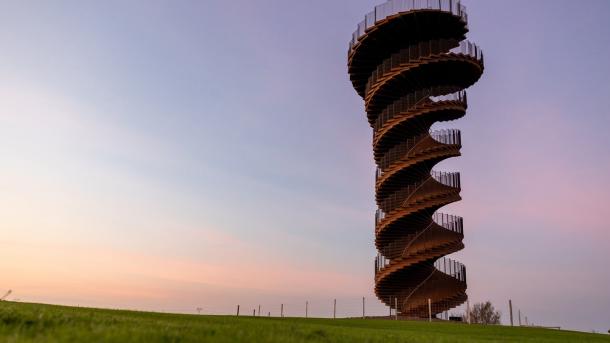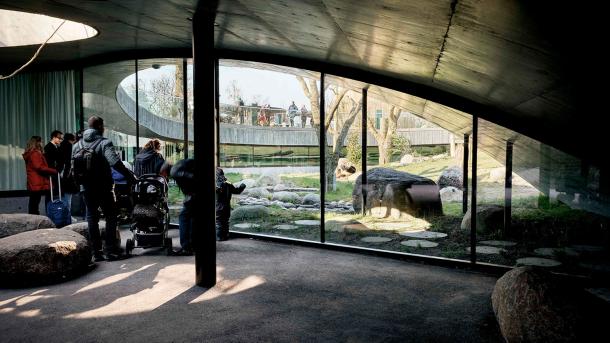
10 Bjarke Ingels Group projects in Denmark
Starchitect Bjarke Ingels has designed jaw-dropping buildings all over the world – from skyscrapers and waterfronts in New York City to Google’s HQ in London – and he comes from Denmark.


A Bjarke Ingels Group tour of Denmark
The Copenhagen-based business Bjarke Ingels Group (BIG) is responsible for some of the most forward-thinking examples of modern architecture in the world - and that includes a lot of projects in Denmark. If you’re interested in seeing how they built a ski slope on top of a waste-to-energy plant, how they have brought community into apartment buildings or how they have found a way to put fun into everyday life, your tour starts here.
Click on the 'map' button to find an interactive map of all these sights, and start planning!
Marsktårnet
Marsktårnet – that’s 'The Marsh Tower' in English – can be found in Southern Jutland. The sculptural 25-metre-high lookout tower takes the shape of a strand of the Wadden Sea's DNA and offers front row seats for the UNESCO-listed national park's sands, sea and offshore islands. Look out for unique wading birds and seals. BIG collaborated on 'A Place to' close by in Esbjerg, if you're looking for a unique place to stay.
Tirpitz
Museums designed by the Bjarke Ingels Group tend to tell a unique story. Tirpitz is a prime example, a spectacular museum hidden under the dunes on the west coast of Jutland in a concrete bunker from World War II. The exhibition space focuses on stories of coastal history, and the setting in an ecological park, surrounded by the coastal environment, just adds to its powerful storytelling.
LEGO House
Who wouldn’t want the brief to design a building for the new LEGO museum – and who better than a Danish architect Bjarke Ingels to take that brief on? BIG and COWI designed LEGO House to look like a huge stack of LEGO when seen from above, and with vast exhibition spaces inside to encourage play in all forms. It’s one of the reasons why Billund has been called the Capital of Children.
AARhus
In Aarhus, the Bjarke Ingels Group got together with the world-renowned Danish city planners and architects Jan Gehl to design a whole neighbourhood around the old container port, Aarhus Ø. The result is a highly liveable space with a harbour bath, waterfront promenades and an apartment building, AARhus, at the heart of it, that draws comparisons with 8Tallet for its liveability.
The Danish Maritime Museum
While we’re underground and talking about museums, how about the Danish Maritime Museum in Helsingør, under an hour north of Copenhagen? This inventive underground museum takes the form of a ship and is moored in a space that was previously the city’s dry dock, bringing new life into a previously disused area. The sunken location also avoids any problems with viewing Helsingør’s other great attraction, Kronborg Castle, just next door.
8Tallet
8Tallet (meaning ‘figure 8’) is one of the most talked-about Bjarke Ingels Group buildings in Copenhagen – a residential block on Ørestad, a short cycle or metro ride from the city centre – designed to balance community life in an apartment block, with a kilometre-long footpath that offers ease of access and space to play and connect. Volunteers offer guided tours – check their website for details.
Copenhill
Copenhagen’s waste-to-energy plant Amager Bakke got the BIG treatment and is now a world-renowed urban ski mountain. It opened in 2017, and in 2019, the ski slope on the roof was opened to the public, complete with ski lifts. It also has the world’s highest climbing wall, a hiking route and an apres ski bar, and is considered an exceptional mix of leisure and city facilities.
noma 2.0
Copenhagen’s most talked-about restaurant got the BIG treatment back in 2018, when they developed noma 2.0. Set in Christiania, the cluster of buildings were designed to reflect Nordic materials and building techniques, and include permagardens, a test kitchen and a bakery. Intriguingly, all rooms are designed so chefs have the best possible view, and so guests can see the chefs at work.
Denmark's harbour baths
Bjarke Ingels is also behind one of the most distinctive features of Denmark’s city harbours: their floating swimming pools. The development of these iconic cultural spots (with three in Copenhagen, and another in Aarhus) has been instrumental in turning the harbours into a place to play, enjoy the water, socialise and relax.
Panda House, Copenhagen Zoo
Our animal friends are not left out of the BIG loop either, Copenhagen Zoo’s Panda House was designed by the firm. The two pandas live in a building shaped like a ying/yang, and that duality is the key here, providing a habitat that suits reclusive pandas and allows visitors to view them clearly without disturbing them. You can also buy a Bjarke Ingels-designed panda figure in the zoo shop.














